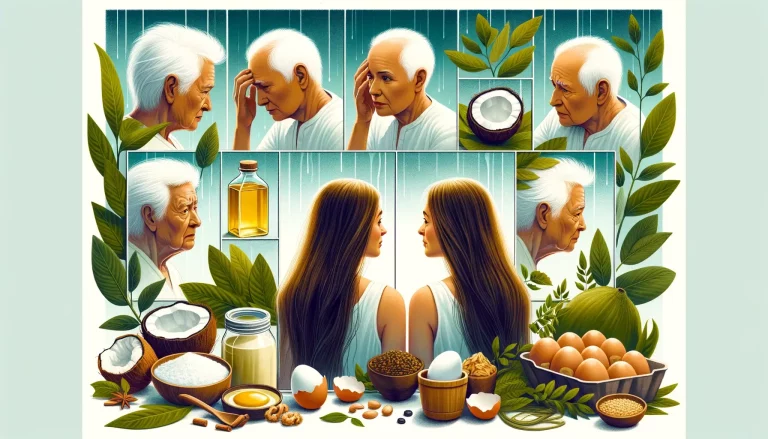You are worried about white hair, do not be, in this article we will explain all measure and prevents to get rid of this grey hair problem as discussed in Wellhealthorganic.com/Know-The-Causes-Of-White-Hair-And-Easy-Ways-To-Prevent-It-Naturally. While white hair is traditionally seen as a sign of wisdom and maturity, early onset can affect self-esteem and lead to a search for remedies.
Key Points
- Genetic factors play a significant role in determining when and how quickly your hair may turn gray or white, with early graying often running in families.
- Nutritional deficiencies, particularly in vitamins B12, D3, and essential minerals like iron, zinc, and copper, can contribute to premature graying by affecting melanin production.
- Stress, both physical and emotional, accelerates the graying process by causing oxidative stress and damaging melanocytes, the cells responsible for hair color.
- Environmental factors, such as pollution, UV exposure, and using hair products with harsh chemicals, can lead to hair damage and premature graying.
- Natural remedies and a healthy diet rich in antioxidants and essential nutrients can support melanin production and overall hair health, potentially delaying or reversing the process of graying.
This comprehensive guide explain the root causes of premature white hair and explores natural ways to prevent or delay its appearance. From dietary recommendations to herbal treatments, we’ll cover a range of solutions that promise to restore the natural vibrancy of your hair.
Whether you’re facing the first signs of graying or looking to prevent it, this article is your go-to resource for understanding and combating premature white hair naturally.
Table of Contents
Wellhealthorganic.com/Know-The-Causes-Of-White-Hair-And-Easy-Ways-To-Prevent-It-Naturally – What Causes White Hair?
Genetics
Genetic predisposition is a primary factor in the development of white hair. If your parents or grandparents started graying early, your chances increase. This hereditary trait dictates when and how quickly your hair will lose its pigment.

Nutritional Deficiencies
Lacking key nutrients such as vitamins B12, D3, and minerals like iron, zinc, and copper can lead to a decrease in melanin production. These deficiencies hinder the body’s ability to produce the pigment necessary for hair color, resulting in premature graying.
Stress
Both physical and emotional stress can accelerate the graying process. Stressful conditions cause oxidative stress in the body, damaging melanocytes and leading to a reduction in melanin production, which is essential for hair color maintenance.

Environmental Influences on Hair Health
Exposure to environmental factors like pollution, UV rays, and harsh weather conditions can significantly impact hair health, leading to damage and premature graying. Pollutants and UV light oxidize the melanin in hair, accelerating the loss of color.
Continuous exposure to these elements without proper hair care can strip the hair of its natural oils, making it more susceptible to turning gray or white earlier than expected. Adopting protective measures, such as wearing hats and using hair products with UV protection, can mitigate these effects and preserve your hair’s natural color for longer.
Can Thyroid Issues Cause Your Hair to Lose Its Color?
Thyroid disorders, both hypothyroidism and hyperthyroidism, can affect your hair’s texture, growth rate, and color. These conditions disrupt hormonal balance, which can influence melanin production and lead to premature graying.
Additionally, thyroid issues can cause hair loss and make the hair appear thinner, further highlighting any change in color. Regular check-ups and managing thyroid health through medication and diet can help in maintaining both the color and health of your hair.
Understanding the Role of Melanin in Hair Color
Melanin is the pigment responsible for giving hair its color, produced by melanocyte cells in the hair follicles. There are two types of melanin: eumelanin, which gives hair brown or black color, and pheomelanin, which results in red and yellow hues.
The balance and presence of these melanins determine the wide range of hair colors. As we age, melanocyte activity slows down, leading to a decrease in melanin and the graying of hair. Factors like genetics, nutrition, and overall health can affect melanin production, influencing how early and quickly we may experience graying.

Wellhealthorganic.com/Know-The-Causes-Of-White-Hair-And-Easy-Ways-To-Prevent-It-Naturally – The Food to Eat to Get Rid of White Hair
Eggs
Eggs are a rich source of biotin and other B vitamins that play a crucial role in maintaining the natural color of your hair by strengthening the hair follicles.
Fish
Fatty fish like salmon and mackerel are rich in omega-3 fatty acids, which are essential for hair health, reducing inflammation around the hair follicles and preventing gray hair.
Berries
Berries are loaded with antioxidants and vitamin C, which protect the hair follicles from damage and stress, one of the causes of premature white hair.
Leafy Greens
Spinach, kale, and Swiss chard are packed with vitamins A and C, essential for sebum production to provide natural hair conditioning and prevent hair from graying.
Lentils
Lentils are packed with protein, iron, zinc, and biotin, nutrients that support hair health and can help in the prevention of premature graying.
Nuts and Seeds
Almonds, sunflower seeds, and flaxseeds contain vitamins and minerals like copper, which are vital for melanin production and maintaining natural hair color.
Sweet Potatoes
Sweet potatoes are a great source of beta-carotene, which the body converts into vitamin A, necessary for the production of sebum that keeps hair healthy and colored.

Wellhealthorganic.com/Know-The-Causes-Of-White-Hair-And-Easy-Ways-To-Prevent-It-Naturally – What Are the Natural Home Remedies to Hair Dye?
Curry Leaves
An ancient remedy, curry leaves are rich in vitamin B, which helps restore hair color by nourishing and strengthening the roots. Boiling curry leaves in coconut oil and applying it to the scalp can improve hair tone over time.
Amla
Amla, or Indian gooseberry, is a superfood for hair. It’s packed with vitamin C and antioxidants, promoting healthier hair growth and preventing premature graying. Amla oil for hair massages or incorporating amla in your diet can have beneficial effects.
Henna
Henna not only colors your hair but also provides deep conditioning. Mixed with fenugreek paste, coffee, or beetroot juice, it can enhance the natural hair color, giving it a rich, lustrous sheen while covering gray strands.
Black Tea
Black tea rinse is a simple yet effective method to darken hair naturally. Its caffeine and antioxidants help in strengthening hair, adding shine, and minimizing gray hair appearance through regular use.
Coconut Oil and Lemon Juice
The combination of coconut oil with a few drops of lemon juice can be an effective remedy for premature graying. Applied to the scalp, it nourishes and promotes healthier hair, potentially darkening the gray strands over time.

Conclusion
In wrapping up, embracing natural methods and lifestyle changes offers a promising pathway to combat premature graying. While genetics and unavoidable environmental factors play their roles, the power of a nutrient-rich diet, stress management, and natural hair care should not be underestimated.
Remember, the journey to restoring or preserving your hair’s natural color is a marathon, not a sprint. It requires commitment, consistency, and patience.
By integrating these holistic practices into your daily routine, you’re not just fighting against premature graying but also investing in your overall health and well-being. Let this guide be your first step towards embracing a fuller, richer, and more vibrant hair life.
FAQs
Why does hair turn gray or white?
Hair turns gray or white due to a decrease in melanin production, the pigment responsible for hair color. This can happen naturally with age, but factors like genetics, nutritional deficiencies, stress, and thyroid problems can cause premature graying. When melanocyte stem cells in the hair follicle cease to produce melanin, hair starts to lose its color.
Can I prevent my hair from turning gray or white prematurely?
While genetics play a significant role in determining when your hair will start to gray, lifestyle and diet changes can help delay the process. Consuming a diet rich in antioxidants, vitamins, and minerals can combat oxidative stress and support melanin production. Regular use of natural remedies like coconut oil, curry leaves, and black tea can also nourish the scalp and hair, potentially slowing down graying.
Are there natural remedies to reverse or reduce gray hair?
Yes, several home remedies have been touted to reduce or reverse graying to some extent. For instance, applying a hair mask made of curry leaves and coconut oil can promote pigmentation. Similarly, rinsing your hair with black tea might darken it. However, effectiveness varies, and these remedies offer more nourishment and health benefits to the hair rather than a complete reversal of graying.
How does stress contribute to premature graying?
Stress can accelerate hair graying through the production of free radicals, which cause oxidative stress in the body. This oxidative stress damages the melanocyte stem cells in the hair follicles, reducing their ability to produce melanin. Managing stress through activities like meditation, exercise, and adequate rest can help mitigate its impact on hair color.
Can hair care products cause my hair to gray?
Certain hair products, especially those containing harsh chemicals like hydrogen peroxide, can damage the hair and scalp, leading to premature graying. Overuse of hair dye can also stress the hair follicles, reducing melanin production over time. Opting for natural hair care products and minimizing the use of dyes can help preserve your hair’s natural color for longer.

With over a decade of experience in the tech industry, Maxwell has been on the front lines of technology, witnessing its rapid evolution. From reviewing the earliest smartphones to dissecting the latest advancements in AI, he has a keen eye for detail and an insatiable curiosity about how tech shapes our world.

